|
TennisOne Lessons

The Whip Forehand:
Weapon of Choice in the 1990s
Jim McLennan, Senior Editor, TennisONE
To see the animation of the whip forehand,
click here.
The big forehand rules the modern game of professional
tennis. Sampras, Becker, Chang, Agassi, Courier, all are willing to run
around their backhand to deliver wicked, furiously spinning topspin bullets
to the corners of their opponent's court. In the 70's and early 80's Connors
or McEnroe never ran around backhands, but rather countered the short ball
to that side with penetrating two fisted drives or cunning backspin approaches.
Rod Laver was the first man to dominate the game with topspin
power. Laver's trademark style was whippy racquet action with tremendous
racquet head speed and offensive plays from all parts of the court. (As
an aside, Sampras watched countless hours of Laver on video, studying
and copying his attacking all court style). Borg parlayed the topspin
style to five Wimbledon titles (in a row). Finally, Lendl took the
topspin forehand up another notch with far more power than Laver or Borg
on the forehand wing, and literally brought us into era of the really big
forehands now seen throughout the modern game.
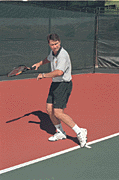 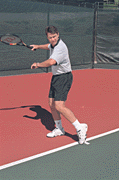 Preparation
is standard with a good shoulder turn, and a pronounced take back of the
left (non dominant arm). Note how the racquet initially "lags"
(frame 1 and 2) similar to many in the modern game, Sampras included. The
wrist appears loose, lazy. Preparation
is standard with a good shoulder turn, and a pronounced take back of the
left (non dominant arm). Note how the racquet initially "lags"
(frame 1 and 2) similar to many in the modern game, Sampras included. The
wrist appears loose, lazy.
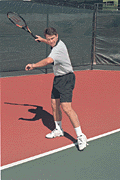 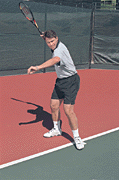 The
backswing is long, and well up. The
backswing is long, and well up.
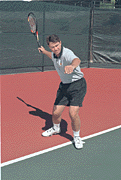 The first element of the whip is the sudden unwinding of the left
arm without much movement of the racquet. Notice
the left arm has totally cleared before the racquet begins to swoop beneath
the ball (refer to the dynamics of throwing in
the TennisONE Lesson library). Loose, loose, loose -- the arm is relaxed,
the forearm and wrist fluid, and even the grip appears loose. The first element of the whip is the sudden unwinding of the left
arm without much movement of the racquet. Notice
the left arm has totally cleared before the racquet begins to swoop beneath
the ball (refer to the dynamics of throwing in
the TennisONE Lesson library). Loose, loose, loose -- the arm is relaxed,
the forearm and wrist fluid, and even the grip appears loose.
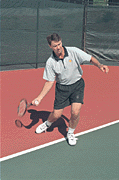 As the racquet approaches the ball, note the buttcap pointing at
the ball. I am pulling on the racquet much as you would pull on a whip. As the racquet approaches the ball, note the buttcap pointing at
the ball. I am pulling on the racquet much as you would pull on a whip.
 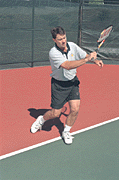 Vertical
strings at contact, and the racquet now rolls up and across the ball, racquet
head acceleration from the forearm not the wrist. The kids call this the
windshield wiper drill, (imagine you are wiping the windshield with the
racquet to feel the forearm turn). Vertical
strings at contact, and the racquet now rolls up and across the ball, racquet
head acceleration from the forearm not the wrist. The kids call this the
windshield wiper drill, (imagine you are wiping the windshield with the
racquet to feel the forearm turn).
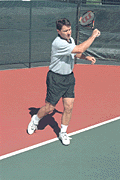 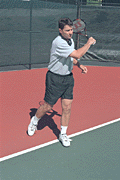 Follow through
finishes well up and over the shoulder, and the final frame again resembles
the modern forehand, with the arm bent and the elbow pointing to the target. Follow through
finishes well up and over the shoulder, and the final frame again resembles
the modern forehand, with the arm bent and the elbow pointing to the target.
The Whip Summarized
Ok, let's put all the pieces back together.
You must take a big full looping backswing on the forehand,
allowing the swinging arm to move up and out. Relax the grip, relax the
arm, relax the wrist (as loose as a whip). Unwind with the left side first.
Quickly pull the arm in as you swing forward . As you near the ball, slow
the hand and snap/whip the racquet up and through the hit. Got it? No? Watch
the animation
of the whip forehand for a few minutes and then go out and try cracking
the whip on one of your unsuspecting tennis buddies. Yes, sadism is part
of the game.
Send email to the author
We encourage you to email your comments (pro, con, appreciative, whatever)
directly to the author. To send email to Jim McLennan, click
here.
Go To:
Other Footwork Lessons In Lessons Library
Top of Lessons Library
Back to TennisONE Home Page
What's New | Tennis
Lessons | Tennis
in Your Area
Tennis Fitness | Tennis
Products | Sponsors/Advertisers/Consultants
webmaster@tennisone.com
TennisONE© is a trademark of TennisONE© and SportsWeb ONE©.
Copyright© 1995. All rights reserved.
|